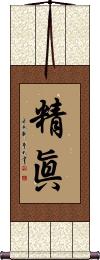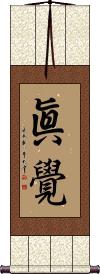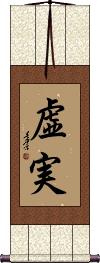Many custom options...
And formats...

Ultimate Reality in Chinese / Japanese...
Buy an Ultimate Reality calligraphy wall scroll here!
Personalize your custom “Ultimate Reality” project by clicking the button next to your favorite “Ultimate Reality” title below...
Ultimate Reality
Paramartha
波羅末陀 is the Chinese and Japanese way to write the ancient Sanskrit word Paramārtha or परमार्थ which now means the highest truth, ultimate truth, ultimate reality, or fundamental meaning.
Paramārtha is the name of a famous Buddhist monk born in 499 CE. Paramārtha traveled the world (including Cambodia and territories that are now part of China) to spread the teachings of Buddhism by translating scriptures into the local languages so the truth could be understood by the masses.
So, we should all want to be a Paramārtha who brings the ultimate truth, knowledge, and enlightenment to others.
The True and Complete Enlightenment
The Supreme Mahayana Truth
大乘無上法 means the supreme Mahāyāna truth.
This refers to the ultimate reality in contrast with the temporary and apparent. Other translations include “the reliance on the power of the vow of the bodhisattva” or “the peerless great vehicle teaching.”
Note: This may suggest that Mahayana Buddhism, as practiced in China, Japan, Korea, Vietnam, and other regions is superior (with subtle arrogance) to the original Theravada (or old school) Buddhism. Mahayana and Theravada Buddhists generally get along better than Catholics and Protestants, but there have been schisms.
Spiritual Peace / Enlightened Peace
These Japanese Kanji, 安心立命, can be translated as “religious enlightenment” or “spiritual peace gained through faith.”
Other dictionaries define as “spiritual peace and enlightenment” or “keeping an unperturbed mind through faith.”
My Buddhist dictionary defines it as “spiritual peace and realization of enlightenment.”
In the Zen school, this is about settling one's body and life; attaining complete peace, and establishing one's course of life in accord with the ultimate reality.
Kyojitsu: Falsehood and Truth
虚実 is a Japanese word that means “falsehood [and] truth” or “fiction [and] fact.”
This concept is used in warfare, gameplay, and martial arts strategies. 虚実 can be a strategy of real and/or deceptive moves. This gets to some Sun Tzu Art of War stuff where in warfare a strategic move is either a real and serious move or it is a deceptive blow.
Let's explore each character in more depth:
虚 was originally written 虛 (there is a very subtle difference in the strokes at the bottom of the character) and means unpreparedness, falsehood, emptiness, void, abstract theory, empty or unoccupied, diffident or timid, false, humble or modest, virtual, or in vain.
In the Buddhist context, 虛 represents the Pali/Sanskrit word “śūnya,” meaning empty, vacant, unreal, unsubstantial, untrue, space, humble, or in vain.
In ancient Eastern/Chinese astronomy, 虛 represents the “Emptiness” constellation (one of the 28 mansions in the sky).
実 was originally 實 in Chinese (they currently write it as 实 in Simplified Chinese) with the meaning, truth, reality, sincerity, honesty, fidelity, and substance.
The Buddhist context is similar, adding real, true, honest, really, solid, definitely, sincere, solid, fixed, full, to fill, fruit, kernel, verily, in fact, the supreme fact, or ultimate reality to the definition.
Not the results for ultimate reality that you were looking for?
Below are some entries from our dictionary that may match your ultimate reality search...
| Characters If shown, 2nd row is Simp. Chinese |
Pronunciation Romanization |
Simple Dictionary Definition |
實 实 see styles |
shí shi2 shih minoru みのる |
More info & calligraphy: Honesty(s,m) Minoru Real, true, honest, sincere; solid; fixed; full; to fill; fruit, kernel, effects; verily, in fact; it is used for 眞, as in 一實 the supreme fact, or ultimate reality; also for bhūta. |
無我 无我 see styles |
wú wǒ wu2 wo3 wu wo muga むが |
More info & calligraphy: Selflessness(1) selflessness; self-effacement; self-renunciation; (2) {Buddh} anatta; anatman; doctrine that states that humans do not possess souls; (female given name) Muga anātman; nairātmya; no ego, no soul (of an independent and self-contained character), impersonal, no individual independent existence (of conscious or unconscious beings, anātmaka). The empirical ego is merely an aggregation of various elements, and with their disintegration it ceases to exist; therefore it has nm ultimate reality of its own, but the Nirvāṇa Sūtra asserts the reality of the ego in the transcendental realm. The non-Buddhist definition of ego is that it has permanent individuality 常一之體 and is independent or sovereign 有主宰之用. When applied to men it is 人我, when to things it is 法我. Cf. 常 11. |
精眞 see styles |
jīng zhēn jing1 zhen1 ching chen shōshin |
More info & calligraphy: Ultimate Reality |
波羅末陀 波罗末陀 see styles |
bō luó mò tuó bo1 luo2 mo4 tuo2 po lo mo t`o po lo mo to haramada |
More info & calligraphy: Paramartha |
大乘無上法 大乘无上法 see styles |
dà shèng wú shàng fǎ da4 sheng4 wu2 shang4 fa3 ta sheng wu shang fa daijō mujō hō |
More info & calligraphy: The Supreme Mahayana Truth |
如 see styles |
rú ru2 ju yuki ゆき |
as; as if; such as {Buddh} (See 真如) tathata (the ultimate nature of all things); (female given name) Yuki tathā 多陀; 但他 (or 怛他), so, thus, in such manner, like, as. It is used in the sense of the absolute, the 空 śūnya, which is 諸佛之實相 the reality of all Buddhas; hence 如 ru is 賃相 the undifferentiated whole of things, the ultimate reality; it is 諸法之性 the nature of all things, hence it connotes 法性 faxing which is 眞實之際極 the ultimate of reality, or the absolute, and therefore connotes 實際 ultimate reality. The ultimate nature of all things being 如 ru, the one undivided same, it also connotes 理 li, the principle or theory behind all things, and this 理 li universal law, being the 眞實 truth or ultimate reality; 如 ru is termed 眞如 bhūtatathatā, the real so, or suchness, or reality, the ultimate or the all, i. e. the 一如 yiru. In regard to 如 ju as 理 li the Prajñā-pāramitā puṇḍarīka makes it the 中 zhong, neither matter nor nothingness. It is also used in the ordinary sense of so, like, as (cf yathā). |
梵 see styles |
fàn fan4 fan bon ぼん |
abbr. for 梵教[Fan4 jiao4] Brahmanism; abbr. for Sanskrit 梵語|梵语[Fan4 yu3] or 梵文[Fan4 wen2]; abbr. for 梵蒂岡|梵蒂冈[Fan4 di4 gang1], the Vatican (1) Brahman (ultimate reality of the universe in Hinduism); Brahma; (2) Brahma (Hindu creator god); (3) (abbreviation) (See 梵語) Sanskrit; (given name) Bon Brahman (from roots bṛh, vṛh, connected with bṛṃh, "religious devotion," "prayer," "a sacred text," or mantra, "the mystic syllable om"; "sacred learning," "the religious life," "the Supreme Being regarded as impersonal," "the Absolute," "the priestly or sacerdotal class," etc. M.W. Translit. |
三印 see styles |
sān yìn san1 yin4 san yin san'in |
The three signs or proofs of a Hīnayāna sutra— non-permanence, non-personality, nirvāṇa; without these the sūtra is spurious and the doctrine is of Māra; the proof of a Mahāyāna sūtra is the doctrine of 一實 ultimate reality, q. v. Also 三法印. |
八諦 八谛 see styles |
bā dì ba1 di4 pa ti hachitai |
The eight truths, postulates, or judgments of the 法相 Dharmalakṣana school, i.e. four common or mundane, and four of higher meaning. The first four are (1) common postulates on reality, considering the nominal as real, e.g. a pot; (2) common doctrinal postulates, e.g. the five skandhas; (3) abstract postulates, e.g. the four noble truths 四諦; and (4) temporal postulates in regard to the spiritual in the material. The second abstract or philosophical four are (5) postulates on constitution and function, e.g. of the skandhas; (6) on cause and effect, e.g. the 四諦; (7) on the void, the immaterial, or reality; and (8) on the pure inexpressible ultimate or absolute. |
四一 see styles |
sì yī si4 yi1 ssu i yoichi よいち |
{cards} (See おいちょかぶ) scoring combination of a 4 and a 1 in oicho-kabu; (given name) Yoichi The four 'ones', or the unity contained (according to Tiantai) in the 方便品 of the Lotus Sutra; i. e. 教一 its teaching of one Vehicle; 行一 its sole bodhisattva procedure; 人一 its men all and only as bodhisattvas; 理一 its one ultimate truth of the reality of all existence. |
四絶 see styles |
sì jué si4 jue2 ssu chüeh |
The four ideas to be got rid of in order to obtain the 'mean' or ultimate reality, according to the 中論: they are that things exist, do not exist, both, neither. |
如実 see styles |
nyojitsu にょじつ |
(1) (usu. 如実に) reality; actuality; actual conditions; true situation; faithful representation; vivid depiction; (2) {Buddh} ultimate reality; absolute truth; (given name) Nyojitsu |
実相 see styles |
jitsusou / jitsuso じつそう |
(1) reality; real state of affairs; true state of affairs; (2) {Buddh} true form of all things as they are; ultimate reality; (surname) Jitsusou |
寂照 see styles |
jí zhào ji2 zhao4 chi chao jakushou / jakusho じゃくしょう |
(personal name) Jakushou nirvāṇa-illumination; ultimate reality shining forth. |
實相 实相 see styles |
shí xiàng shi2 xiang4 shih hsiang jissō |
actual situation; the ultimate essence of things (Buddhism) Reality, in contrast with 虛妄; absolute fundamental reality, the ultimate, the absolute; the 法身, i.e. dharmakāya, or 眞如 bhūtatathatā. Other terms are 一實; 一如; 一相; 無相; 法證; 法位; 涅槃; 無爲; 眞諦; 眞性; 眞空; 實性; 實諦; 實際, q.v. |
悟入 see styles |
wù rù wu4 ru4 wu ju gonyuu / gonyu ごにゅう |
to understand; to comprehend the ultimate essence of things (Buddhism) (n,vs,vi) {Buddh} entering enlightenment To apprehend or perceive and enter into (the idea of reality). Name of a Kashmir monk, Sugandhara. |
法身 see styles |
fǎ shēn fa3 shen1 fa shen hotsushin ほつしん |
{Buddh} (See 三身) dharmakaya (dharma body, Buddhism's highest form of existence); (surname) Hotsushin dharmakāya, embodiment of Truth and Law, the "spiritual" or true body; essential Buddhahood; the essence of being; the absolute, the norm of the universe; the first of the trikāya, v.三身. The dharmakāya is divided into 總 unity and 別 diversity; as in the noumenal absolute and phenomenal activities, or potential and dynamic; but there are differences of interpretation, e.g. as between the 法相 and 法性 schools. Cf. 法身體性. There are many categories of the dharmakāya. In the 2 group 二法身 are five kinds: (1) 理 "substance" and 智 wisdom or expression; (2) 法性法身 essential nature and 應化法身 manifestation; the other three couples are similar. In the 3 group 三法身 are (1) the manifested Buddha, i.e. Śākyamuni; (2) the power of his teaching, etc.; (3) the absolute or ultimate reality. There are other categories. |
眞如 see styles |
zhēn rú zhen1 ru2 chen ju shinnyo しんにょ |
(surname) Shinnyo bhūtatathatā, 部多多他多. The眞 is intp. as 眞實 the real, 如 as 如常 thus always or eternally so; i.e. reality as contrasted with 虛妄 unreality, or appearance, and 不變不改 unchanging or immutable as contrasted with form and phenomena. It resembles the ocean in contrast with the waves. It is the eternal, impersonal, unchangeable reality behind all phenomena. bhūta is substance, that which exists; tathatā is suchness, thusness, i.e. such is its nature. The word is fundamental to Mahāyāna philosophy, implying the absolute, the ultimate source and character of all phenomena, it is the All. It is also called 自性淸淨心 self-existent pure Mind; 佛性 Buddha-nature; 法身 dharmakāya; 如來藏 tathāgata-garbha, or Buddha-treasury; 實相 reality; 法界 Dharma-realm; 法性Dharma-nature; 圓成實性 The complete and perfect real nature, or reality. There are categories of 1, 2, 3, 7, 10, and 12 in number: (1) The undifferentiated whole. (2) There are several antithetical classes, e.g. the unconditioned and the conditioned; the 空 void, static, abstract, noumenal, and the 不 空 not-void, dynamic, phenomenal; pure, and affected (or infected); undefiled (or innocent), i.e. that of Buddhas, defiled, that of all beings; in bonds and free; inexpressible, and expressible in words. (3) 無相 Formless; 無生 uncreated; 無性 without nature, i.e. without characteristics or qualities, absolute in itself. Also, as relative, i.e. good, bad, and indeterminate. (7, 10, 12) The 7 are given in the 唯識論 8; the 10 are in two classes, one of the 別教 cf. 唯識論 8; the other of the 圓教, cf. 菩提心義 4; the 12 are given in the Nirvana Sutra. |
眞空 see styles |
zhēn kōng zhen1 kong1 chen k`ung chen kung mahiro まひろ |
(female given name) Mahiro (1) The absolute void, complete vacuity, said to be the nirvana of the Hīnayāna. (2) The essence of the bhūtatathatā, as the 空眞如 of the 起信論, 唯識, and 華嚴. (3) The void or immaterial as reality, as essential or substantial, the 非 空 之 空 not-void void, the ultimate reality, the highest Mahāyāna concept of true voidness, or of ultimate reality. |
眞際 眞际 see styles |
zhēn jì zhen1 ji4 chen chi shinsai |
The region of reality, ultimate truth, idem 眞實際. |
空解 see styles |
kōng jiě kong1 jie3 k`ung chieh kung chieh kūge |
The interpretation (or doctrine) of ultimate reality. |
緣理 缘理 see styles |
yuán lǐ yuan2 li3 yüan li enri |
To study, or reason on fundamental principles; to contemplate ultimate reality, cf. 緣事. |
見眞 见眞 see styles |
jiàn zhēn jian4 zhen1 chien chen kenshin |
To behold truth, or ultimate reality. |
觀慧 观慧 see styles |
guān huì guan1 hui4 kuan hui kane |
The wisdom which penetrates to ultimate reality. |
觀解 观解 see styles |
guān jiě guan1 jie3 kuan chieh kange |
To contemplate ultimate reality and unravel or expound it. |
究竟佛 see styles |
jiū jìng fó jiu1 jing4 fo2 chiu ching fo kukyō butsu |
The fundamental, ultimate, or supreme Buddha, who has complete comprehension of truth; Buddha in his supreme reality. |
第一義 第一义 see styles |
dì yī yì di4 yi1 yi4 ti i i daiichigi / daichigi だいいちぎ |
(1) primary significance; primary importance; first principle; (2) {Buddh} absolute truth; ultimate truth The supreme, or fundamental meaning, the supreme reality, i. e. enlightenment. |
勝義無性 胜义无性 see styles |
shèng yì wú xìng sheng4 yi4 wu2 xing4 sheng i wu hsing shōgi mushō |
non-nature of ultimate reality |
十二眞如 see styles |
shí èr zhēn rú shi2 er4 zhen1 ru2 shih erh chen ju jūni shinnyo |
The twelve aspects of the bhūtatathhatā or the ultimate, which is also styled the 十二無為 "inactive" or nirvana-like: and the 十二空 "void" or immaterial: (1) The chen ju itself; (2) 法界 as the medium of all things; (3) 法性 as the nature of all things; (4) 不虛妄性 its reality contra the unreality of phenomena; (5) 不變異性 its immutability contra mortality and phenomenal variation; (6) 平等性 as universal or undifferentiated; (7) 離生性 as immortal, i.e. apart from birth and death, or creation and destruction; (8) 法定 as eternal, its nature ever sure; (9) 法住 as the abode of all things; (10) 實際 as the bounds of all reality; (11) 虛空界 as the realm of space, the void, or immateriality; (12)不思議界 as the realm beyond thought or expression. |
我空眞如 see styles |
wǒ kōng zhēn rú wo3 kong1 zhen1 ru2 wo k`ung chen ju wo kung chen ju gakū shinnyo |
The Hīnayāna doctrine of impersonality in the absolute, that in truth there is no ego; this position abrogates moral responsibility, cf. 原人論. |
Click here for more ultimate reality results from our dictionary
The following table may be helpful for those studying Chinese or Japanese...
| Title | Characters | Romaji (Romanized Japanese) | Various forms of Romanized Chinese | |
| Ultimate Reality | 精眞 | shou shin / shoushin / sho shin | jīng zhēn jing1 zhen1 jing zhen jingzhen | ching chen chingchen |
| Paramartha | 波羅末陀 波罗末陀 | ha ra ma da haramada | bō luó mò tuó bo1 luo2 mo4 tuo2 bo luo mo tuo boluomotuo | po lo mo t`o polomoto po lo mo to |
| The True and Complete Enlightenment | 眞覺 眞觉 | shinkaku | zhēn jué / zhen1 jue2 / zhen jue / zhenjue | chen chüeh / chenchüeh |
| The Supreme Mahayana Truth | 大乘無上法 大乘无上法 | dai jou mu jou hou daijoumujouhou dai jo mu jo ho | dà shèng wú shàng fǎ da4 sheng4 wu2 shang4 fa3 da sheng wu shang fa dashengwushangfa | ta sheng wu shang fa tashengwushangfa |
| Spiritual Peace Enlightened Peace | 安心立命 | an jin ritsu myou anjinritsumyou an jin ritsu myo | ||
| Kyojitsu: Falsehood and Truth | 虚実 | kyo jitsu / kyojitsu | ||
| In some entries above you will see that characters have different versions above and below a line. In these cases, the characters above the line are Traditional Chinese, while the ones below are Simplified Chinese. | ||||
Successful Chinese Character and Japanese Kanji calligraphy searches within the last few hours...









